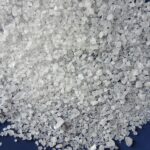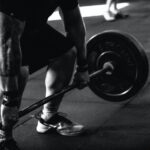
Lifting weights, or strength training, involves resistance to induce muscular contraction, which builds strength, anaerobic endurance, and the size of skeletal muscles. When you engage in this high-intensity training session, you’re challenging your muscles in new ways and pushing them beyond their comfort zone. Your muscles respond to this strain by creating tiny micro-tears in the muscle fibers.
Table of Contents (click to expand)
How Lifting Weights Impacts the Body
When you lift weights, the resistance causes micro-tears in the muscle fibers. This isn’t harmful but rather a natural process that leads to muscle growth and strengthening. When these fibers repair themselves, they grow larger and more robust to accommodate the resistance level you’ve set for them. This muscle repair process occurs mainly during sleep and rest days, so rest is equally important as exercise for muscle growth.
The Role of Strength Training in Muscle Growth
Strength training sessions are crucial for building muscle. During these sessions, you stress your muscles more than they are accustomed to, creating a stimulus for growth. Your body responds by repairing and reinforcing the damaged muscle fibers, increasing muscle size and strength over time. Regular weight lifting improves muscle mass and enhances muscular endurance, power, and coordination.
Why Am I So Hungry After Lifting Weights?
Many individuals experience a sharp increase in hunger after weightlifting. This is because, during intense exercise, your body burns through stored glycogen and starts burning fat, not muscle carbohydrates, resulting in an energy deficit. This energy shortage triggers the hunger response, urging you to eat and replenish your energy stores.
Metabolic Changes: The Physiology Behind Hunger
After a weightlifting session, your body goes through a series of metabolic changes. To repair the micro-tears in the muscles, your body needs energy and building blocks – essentially, more food.
This demand increases your metabolic rate, the rate at which your body converts food into energy. Consequently, this basal metabolic rate increase stimulates the feeling of hunger as your body seeks to replenish the expended energy.
The Link Between Muscle Mass and Hunger
Muscle tissues are metabolically more active than fat tissues. This means they require more energy to function, even at rest. Therefore, the more muscle mass you have, the more calories you burn and the more food you need to compensate for the energy expenditure.
The Role of Hormones in Hunger After Lifting Weights
Exercise has a complex effect on our hunger-regulating hormones. Intense exercise like weightlifting can stimulate the production of ghrelin, often known as the ‘hunger hormone.’
Ghrelin levels usually rise before meals and decrease after you feel hungry and satiated. It’s responsible for signaling your brain that it’s time to eat. Therefore, an increase in ghrelin levels following a workout can cause an increase in appetite, making you feel hungrier.
Importance of Nutrition in Strength Training
Nutrition is a key component in muscle recovery and growth. After a strenuous workout, your muscles are starved for nutrients. Consuming enough protein, carbohydrates, and fats can provide these necessary nutrients, helping in muscle repair and growth and replenishing energy stores.
Nutrient Timing: Pre- and Post-Workout Meals
The timing of meals around your workouts can significantly influence your post-workout hunger and the effectiveness of your activities. Consuming a balanced meal 2-3 hours before your training can ensure you have enough fuel for your session.
Meanwhile, a meal or snack rich in protein and carbohydrates within an hour after your workout can kickstart recovery and replenish energy stores, helping to reduce post-workout hunger.
The Role of Protein in Muscle Growth and Satiety
Protein plays a dual role in weightlifting. It helps repair and build muscles and is crucial in making you feel satiated. Consuming protein-rich foods or having a protein shake after a workout can help curb post-workout hunger pangs.
Carbohydrates and Their Role in Satiating Hunger
Carbohydrates serve as the body’s primary source of energy. They are stored in the body as glycogen in the liver and muscles. When you engage in high-intensity exercise, your body taps into these glycogen stores for energy.
After a workout, consuming foods rich in complex carbohydrates can help your body weight replenish these energy stores and keep post-workout hunger at bay.
The Impact of Fat on Appetite and Muscle Growth
Fat is not just stored energy; it’s also crucial for hormone regulation, nutrient absorption, and providing a sense of fullness. Healthy fats, such as avocados, nuts, and seeds, can help regulate your appetite through hunger hormones, making you feel more satiated. Including these foods in your post-workout meals can prevent overeating and manage post-workout hunger.
Hydration and Its Influence on Hunger
Thirst is often confused with hunger, making hydration a critical factor in managing post-workout hunger. During workouts, your body loses fluids through sweat. Replacing these fluids by staying hydrated can prevent dehydration, which often mimics the signs of hunger. Drinking water before, during, and after your workouts is a good practice.
Is It Normal to Be Very Hungry After Strength Training?
Feeling hungry after a strength training session is common and normal. Your body has just undergone intense physical activity, and it’s natural for it to demand nutrients to recover and grow. However, it’s crucial to provide your body with the right nutrients to ensure it functions optimally and avoid unnecessary weight gain.
How to Manage Hunger After Lifting Weights
Managing hunger after lifting weights involves planning meals and eating balanced, nutrient-dense foods. Healthy foods with adequate protein, complex carbohydrates, and healthy fats can keep you full and provide your body with the necessary nutrients for recovery and growth.
Can Overeating Hinder Your Progress in Strength Training?
While your body does need additional calories to repair and grow muscles, overeating can lead to weight gain, particularly if you’re consuming more calories than you’re burning. Over time, this can gain weight, affecting your body composition and hindering your progress in strength training.
The Influence of Rest and Recovery on Hunger
Rest is equally important as exercise for muscle growth. During rest, the body repairs and grows muscle tissue. Getting sufficient rest can also help manage post-workout hunger by ensuring your body has ample time to recover.
Listen to Your Body: The Importance of Intuitive Eating
Listening to your body’s hunger cues is crucial. If you’re hungry after lifting weights, your body is likely signaling that it needs more fuel for recovery and growth. It’s important to heed these signals and ensure you’re making nutritious food choices and eating habits that align with your fitness goals.
Incorporating Weightlifting Into a Healthy Lifestyle
Weightlifting, while a highly effective exercise for building muscle and strength, is only one aspect of maintaining a healthy lifestyle. Its impact can be significantly amplified with healthy lifestyle choices, such as a balanced diet, proper rest, and adequate hydration.
Moreover, Weightlifting typically increases appetite due to muscle repair and growth’s energy and nutrient demands. However, this increased appetite should be met with wise food choices to ensure a positive impact on overall health.
Balance in Diet: Nutrient-Dense Foods vs. Empty-Calorie Options
Increased hunger following a weightlifting session can tempt some to reach for quick, convenient food options, many of which are unhealthy foods often high in calories but low in essential nutrients – what we call ’empty-calorie’ foods.
However, such choices can be counterproductive, leading to unnecessary weight gain without providing the nutrients required for muscle recovery and growth.
In contrast to processed foods, nutrient-dense foods, including lean proteins, fruits, vegetables, whole grains, and healthy fats, provide the necessary building blocks for muscle repair while contributing to overall health.
A diet rich in these foods ensures that the increased appetite after lifting weights leads to beneficial outcomes, like muscle growth and sustained energy levels, rather than unhealthy weight gain.
Frequently Asked Questions
Does Gaining Muscle Make You Hungrier?
Yes, gaining muscle has a lot of calories and can make you feel hungrier. Muscle tissues are more metabolically active than fat tissues, requiring more energy to function, even at rest.
Therefore, the more muscle mass you have, the more calories you’ll burn and consequently, the more food your body will crave to meet its energy needs.
Why Do I Get Excessive Hunger After Working Out?
Excessive hunger after working out, particularly after high-intensity workouts like Weightlifting, can be attributed to a few factors:
- Energy Deficit: During intense workouts, your body uses stored glycogen and starts burning fat, creating an energy deficit. This shortage triggers the hunger response, urging you to eat and replenish your energy stores.
- Hormonal Changes: Exercise can stimulate the production of ghrelin, also known as the ‘hunger hormone,’ leading to increased appetite.
- Muscle Repair and Growth: After a workout, your body needs to repair the micro-tears in the muscles and facilitate muscle growth, both of which require extra nutrients and energy.
How Do I Control My Hunger When Lifting Weights?
Controlling hunger when lifting weights can be managed through proper nutrition and the timing of meals:
- Pre- and Post-Workout Meals: A balanced meal a few hours before your workout ensures your body has sufficient fuel. Post-workout, consume a meal or snack rich in protein and carbohydrates to kickstart recovery and replenish energy stores.
- Protein and Fiber: Foods rich in protein and fiber can make you feel fuller and satiated for extended periods, helping control hunger.
- Hydration: Drinking water before, during, and after your workout can help keep dehydration, which can be mistaken for hunger, at bay.
- Listen to Your Body: Remember, hunger is your body’s way of telling you it needs more fuel. If you’re hungry, you likely need to eat. Just make sure your choices align with your fitness goals.
Should I Eat More After Lifting?
After lifting weights, refueling your body to support the recovery process and facilitate muscle growth is essential. This usually means consuming more calories than you would on a rest day, primarily from protein to help repair and build muscle and carbohydrates to replenish energy stores.
However, the exact amount of food intake will depend on your body composition, workout intensity, and fitness goals. It’s always a good idea to consult a registered dietitian or a certified personal trainer to help you determine the best dietary plan.
Conclusion
Feeling hungry after a weightlifting session is a typical response and a sign that your body is working hard to repair and grow muscles.
Eating the right foods and following a balanced diet can support your body’s recovery and muscle growth processes, helping you meet your fitness goals and lose weight healthily and sustainably.



































